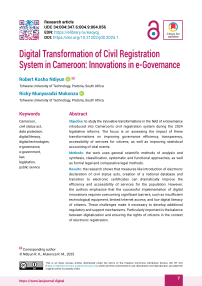Digital Transformation of Civil Registration System in Cameroon: Innovations in e-Governance
Автор: Ndiyun, R. K., Mukonza, R. M.
Журнал: Journal of Digital Technologies and Law @lawjournal-digital
Статья в выпуске: 3 (1), 2025 года.
Бесплатный доступ
Objective: to study the innovative transformations in the field of e-Governance introduced into Cameroon’s civil registration system during the 2024 legislative reforms. The focus is on assessing the impact of these transformations on improving governance efficiency, transparency, accessibility of services for citizens, as well as improving statistical accounting of vital events. Methods: the work uses general scientific methods of analysis and synthesis, classification, systematic and functional approaches, as well as formal legal and comparative legal methods. Results: the research shows that measures like introduction of electronic declaration of civil status acts, creation of a national database and transition to electronic certificates can dramatically improve the efficiency and accessibility of services for the population. However, the authors emphasize that the successful implementation of digital innovations requires overcoming significant barriers, such as insufficient technological equipment, limited Internet access, and low digital literacy of citizens. These challenges make it necessary to develop additional regulatory and support mechanisms. Particularly important is the balance between digitalization and ensuring the rights of citizens in the context of electronic registration. Scientific novelty: the work provides unique empirical data on digitalization of public services in Cameroon. This is especially important for the countries of the global South, where such transformations are slow and fragmentary. The study makes a significant contribution to the scientific debate by expanding understanding of digital technology adoption models through the lens of expected usefulness and perceived ease of use in developing countries. Practical significance: recommendations for legislators, government officials and other stakeholders were developed. The authors emphasize the need to adopt a regulatory framework as soon as possible, introduce educational programs for employees and citizens, and ensure access to digital technologies. These measures aim at creating a sustainable infrastructure for an effective transition to electronic systems and improving the quality of public services. The work contributes to the study of public governance digitalization, offering both theoretical concepts and practical solutions that can be adapted for other countries with similar challenges.
Cameroon, civil status act, data protection, digital literacy, digital technologies, e-governance, e-government, law, legislation, public service
Короткий адрес: https://sciup.org/14131896
IDR: 14131896 | УДК: 34:004:347.6:004.9:004.056 | DOI: 10.21202/jdtl.2025.1


